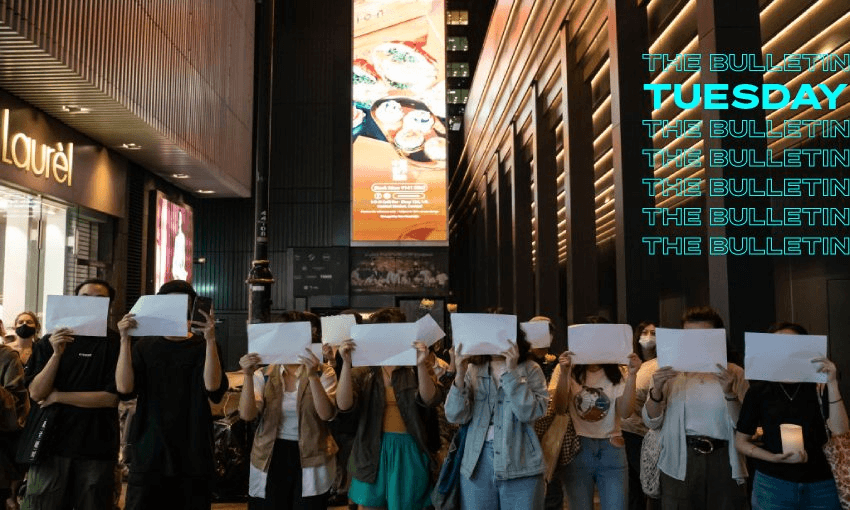Protests against China’s Covid-zero policy continue as cases rise here. Across the Tasman, the National party is banking on the ghosts of Covid policy past to lift its share of the overseas vote, writes Anna Rawhiti-Connell in this excerpt from The Bulletin. To receive The Bulletin in full each weekday morning, sign up here.
“A single spark can start a prairie fire”
As Covid cases in New Zealand rise and we continue to live with almost no restrictions, the protests against the Chinese Communist Party’s Covid-zero restrictions that have broken out in China are a reminder that the pandemic is still highly consequential. Editor of the Dominion Post and former Beijing bureau chief for the Washington Post Anna Fifield, has an excellent piece explaining what’s happening in China right now. Citing both a line from Mao Zedong (“a single spark can start a prairie fire”) and The Economist, Fifield pinpoints exactly why these protests are so significant.
China’s immunity gap
China now largely stands alone in the world in its pursuit of a zero-Covid strategy. Its approach has meant most people haven’t been exposed to the virus and while vaccination rates are high overall (90%), only 65% of those over 80 are vaccinated. Since the beginning of the pandemic, it’s also had a policy of only using domestically-produced vaccines which were developed using the original strain of the virus. The Washington Post has a good outline of the immunity issue. Isabel Hinton offers some political framing in the Guardian, writing, “It is difficult to reverse policy in any political system, but it is perhaps hardest in a top-down authoritarian model… if the leader is strongly associated with it [the policy], as in this case, a U-turn implies failure – something leaders who seek to maintain a myth of omniscience and omni-competence find difficult.”
Tourism and trade implications for New Zealand
Bernard Hickey noted on Twitter that China is our largest trading partner and Australia our second. China is also Australia’s largest trading partner. Economic dominoes. Pre-pandemic, Chinese tourists were our second largest source of visitor revenue and third largest in terms of arrivals. Tourism minister Stuart Nash said last week it could be 2024 before visitors from China return to our shores due to the country’s Covid-zero policy. Deutsche Bank has said that China will not reopen until late Autumn 2023, and until then, it sees China’s growth stagnating. A new report from the New Zealand-China Council is advising businesses to consider exporting digital services noting the hit education and tourism have taken because of China’s Covid-zero policy.
Opposition courting overseas voters off back of Covid border closures
With the one-year anniversary of the end of last year’s Auckland lockdown approaching this week, and despite the consequential impacts of what’s happening in China, it can feel like some aspects of the pandemic are a distant memory. Not so for the opposition who, according to this report from the Melbourne Age, are looking to tap into the disillusionment felt by New Zealanders overseas when our borders were closed. Three National party frontbench MPs arrived in Sydney on Sunday night and addressed Kiwis living in Australia at the Liberal party headquarters last night. Traditionally, overseas votes tend to swing to the left but Chris Bishop, who is chair of the party’s 2023 election campaign, told The Age that “our goal for 2023 is to change that.”
